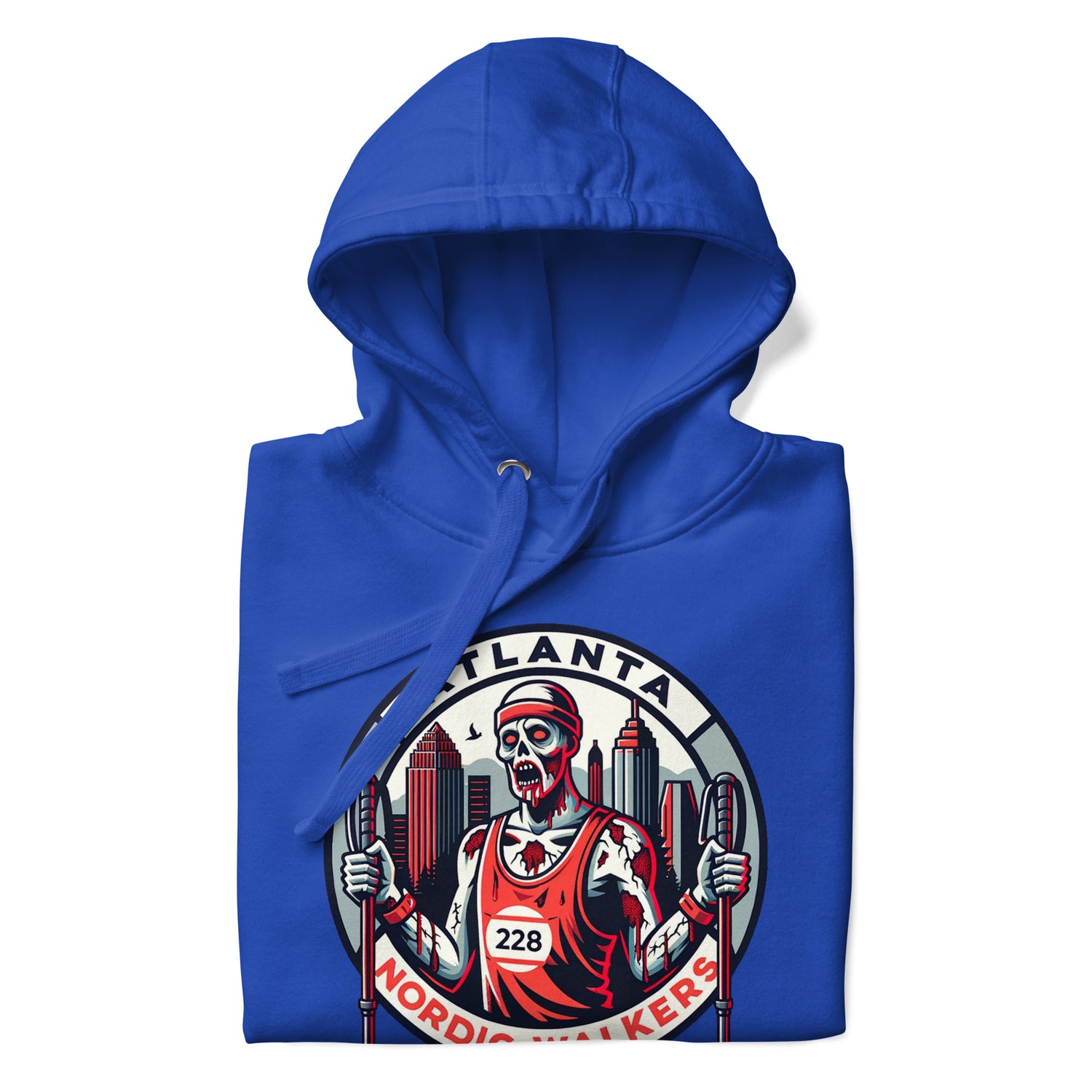David Hasselhoff, Lego Bricks, and Walking Poles: A Derby to Remember
Share
It was one of those afternoons when reality had slipped into something more comfortably absurd. The sun hung lazily in the sky as if it had nothing better to do, while crowds filtered into the arena, unsure whether they were witnessing a Roller Derby match, a philosophical debate, or some kind of elaborate interpretive dance-off—the truth, as usual, lay somewhere comfortably in between.
The Atlanta Nordic Walkers made their entrance with an audacity that could only come from a team whose motto was, "Walking is just running with dignity". With rhythmic stomps that resounded with a purposeful aimlessness, they began marching in formation to a mashup of "Walk This Way" by Run-D.M.C. and Aerosmith, seamlessly blending into "Speed" by Atari Teenage Riot—a track born straight out of Berlin's rebellious heart. The resulting beat was so cacophonously disobedient that several pigeons promptly left the building, while people in the bleachers either erupted in wild cheers, stared at each other with mouths agape, or just sat back, munching on popcorn as if they were watching an unusually entertaining documentary about the mating habits of sentient chaos. The Walkers, undeterred by this multi-dimensional unraveling, pressed on—headbands askew, walking poles ready.
“And now,” the announcer—who was by now taking large gulps from a tea cup labeled ‘Definitely NOT Chaos’—said with breathless anticipation, “what will the Berlin Wall BreakDancers answer with?” There was a moment of collective suspense, a silence so potent it seemed to echo. And then it happened. The unmistakable notes of David Hasselhoff’s “Freedom” began to drift into the arena like an old friend showing up at your house with a casserole that you hadn't asked for but somehow now really needed.
The BreakDancers entered with the kind of confidence only those who had once torn down metaphysical walls of existence could muster—or perhaps they were just exceptionally unbothered by the fact that their entrance music involved David Hasselhoff, which in itself is a testament to their strength. Klaus Müller led the team, his steps a mix of moonwalks, break spins, and something that was definitely a cha-cha if you squinted hard enough. Anka Steinbrecher followed, her movements smooth, her gaze the sort that could stare down a bureaucracy until it apologized.
The game commenced in a swirl of rhythmic clashing—Nordic Walkers pole-vaulted past BreakDancers who were too busy windmilling to even notice. Points were scored, but not in any orderly manner, as any spectator attempting to keep track of them would find themselves rapidly sinking into an existential mire of numerical improbability. The Berlin Wall BreakDancers appeared to dominate; they seemed to be leading with a significant margin, not because they understood the rules but because they were possibly making them up as they went along. Their score soared into the triple digits, at which point they began adding exclamation marks for good measure.
The Atlanta Nordic Walkers, however, displayed the kind of resilience that is often only seen in stubborn houseplants owned by someone with the opposite of green fingers—perhaps more like 'brown thumbs of doom,' where even a cactus might consider an escape plan. Stickler, having somehow squeezed in some Roller Derby strategy studying between reading 'The Nordic Way' and 'Zen and the Art of Walking in Circles', led the team with surprising tactical finesse. They employed classic Roller Derby strategies—executing perfectly timed whips, where a skater used another to gain momentum, and forming human walls to block the BreakDancers' path—much to the frustration of the BreakDancers, for whom breaking through walls usually is their forte. Stickler then transitioned seamlessly into his signature 'Stickler Sweep', ceremoniously using his poles to sweep away imaginary obstacles and clear the path ahead, much to the bewilderment of his opponents. Zombie Number 228—whose name was as enigmatic as his skating—managed to pull off a jammer star pass, handing over the star helmet cover to Stickler in a daring move that sent the audience into a frenzy.
Meanwhile, the BreakDancers used their own unconventional tactics to change momentum. Klaus Müller attempted a move that could only be described as “the existential pirouette,” spinning in place long enough to baffle the opposing blockers into letting him pass. He followed it up with his signature 'Windmill of Freedom', stirring up both confusion and dust as he spun his way through the chaos. Anka Steinbrecher executed her 'Pebble Pirouette', a dizzying spin that sprayed gravel—somehow carried in her pockets—into the air, mesmerizing the Atlanta players while she simultaneously scored points. The BreakDancers’ pivot, who seemed to have an uncanny ability to change roles on a whim, kept the Nordic Walkers guessing as to who exactly they should be blocking. Anka used the 'Tidal Flow Practice' technique recommended by Kelp Youngweed to respond to the high-pressure environment—moving fluidly like kelp swaying with the tide—allowing her to seamlessly blend between jammer and blocker roles, adapting to unexpected changes in tempo and obstacles.
At one point, the BreakDancers performed their infamous 'Brick Drop'—a maneuver where Klaus 'The Krazy K' Müller and Anka 'Rubble Roller' Steinbrecher, with casual nonchalance, produced handfuls of Lego bricks from their pockets and scattered them across the track. The once-flat floor turned into a minefield of colorful, foot-piercing hazards, forcing the Nordic Walkers to tiptoe around in confusion. It was as bewildering as it was effective, leaving the Walkers flailing as the BreakDancers leaped through the chaos, effortlessly scoring points.
In a particularly chaotic moment, Stickler found himself cornered by two BreakDancers near the edge of the track. With no other option, he attempted an audacious wall ride, using the arena’s side barrier to skate horizontally above the blockers. The crowd gasped in disbelief as he managed to maintain his balance—a feat that seemed to defy not only physics but also common sense, which, in the Offbeat League, was already in dangerously short supply. He landed gracefully, pivoted, and shot forward to score a series of points just before Art Steelmoor blew the final whistle.
The score—blinking in the inexplicable glow of the scoreboard—read: Berlin Wall BreakDancers 229, Atlanta Nordic Walkers 228. A moment of silence. The crowd collectively looked at the scoreboard, then at each other, then back at the scoreboard. It was as if the universe itself had taken a pause to shrug. When exactly had the Atlanta Nordic Walkers scored all those 228 points? Had it been during that particularly rhythmic bit of synchronized stretching? Had they managed to sneak their poles into the scorekeeper's booth and accidentally pushed a few buttons? Or maybe it was just someone with an affinity for chaos pressing the wrong button?
The BreakDancers scraped by with a narrow win, in a bout where they had taken victory for granted. They hadn't counted on the sheer force of the Atlanta Nordic Walkers' entrance—a powerful sound wave that shook the arena and rattled their confidence. Perhaps next time, The Hoff would have to step aside for something a bit more thunderous.
Stickler exited the arena with a walking pole raised high, proclaiming loudly, “Ich bin ein Berliner!”—which elicited a cheer from at least twelve confused onlookers and one currywurst vendor.
Eloise Inkwell



